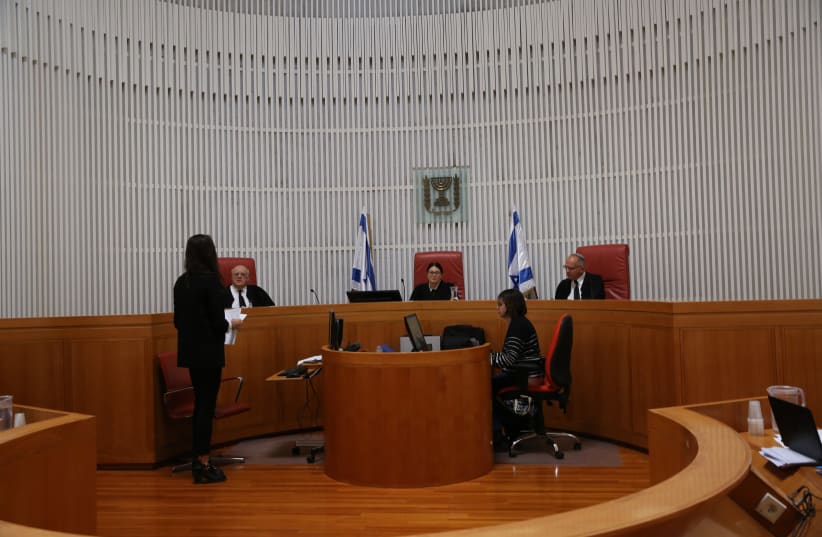On Monday, the state filed a legal brief regarding a dispute over how much access to lawyers security detainees will have during the coronavirus period.
The brief presented itself as moving toward a compromise with Adalah – The Legal Center for Arab Minority Rights in Israel – the organization filing the petition, but the NGO told The Jerusalem Post Monday night that the proposal was a red herring to distract from a fundamentally illegal situation.
The state’s brief was responding to Adalah’s complaint that prisons were starting to not only prevent prisoners from meeting with their lawyers physically, but had also started blocking them from having telephone calls with their lawyers.
Adalah’s petition said that the state was trying to distinguish between security prisoners and non-security prisoners, but that this very distinction blew out of the water any idea that the new directives could be connected due to the coronavirus situation.
The Israel Prisons Service has been issuing updates intermittently with restrictions on lawyers physically visiting prisons as well as other restrictions due to the coronavirus crisis.
The High Court quickly got the state to clarify that minor-security prisoners would continue to be allowed telephone calls with their lawyers.
Regarding adult security prisoners, the High Court ordered the state to clarify the basis for coronavirus-related restrictions by Monday.
The state’s Monday-night brief laid out a new procedure for adult security detainees to speak by telephone with their lawyers during the coronavirus period.
Adalah attacked the procedure as completely impractical, adding that the state still had failed to present a principled reason to treat the right of adult security detainees to a telephone call with their lawyers differently than other prisoners.
The NGO vowed to continue to challenge the state over the issue before the High Court.
IN A SEPARATE petition on Sunday, the Association for Civil Rights in Israel asked the High Court to declare the current surveillance by the Shin Bet (Israel Security Agency) of coronavirus-infected citizens unconstitutional.
ACRI’s petition is a second round of legal challenges to the Shin Bet surveillance, which went into effect in mid-March.
In the first round, the Blue and White Party, along with other political parties and many NGOs, demanded that the surveillance program be halted if it did not undergo Knesset oversight.
The petition and other legal developments led to multiple Knesset committees, including the Intelligence Subcommittee led by chairman Gabi Ashkenazi (Blue and White), which was able to hold proceedings after having been delayed by the ruling transitional coalition.
Ashkenazi’s committee made some changes to the surveillance program and questioned government officials extensively, but eventually endorsed its broader goals and agreed that the state had the authority to authorize the program without a new law.
ACRI’s petition said that the subcommittee did not go far enough in protecting citizens’ rights from Shin Bet surveillance.
The group challenged the very constitutionality of the program, and said that if a legal version of the program could be constructed, it would only be through a new Knesset law.
Anything less than a new Knesset law would not permit a sufficient public debate over the issue, and also would be stretching existing Shin Bet authority into areas beyond what the current laws allow.
The biggest objection to Shin Bet surveillance has been that the agency exists to fight terrorism, mostly from foreigners, not to spy on its own citizens.
Another petition pending before the High Court, which was filed by Yesh Din, demands that the IDF obtain court warrants before it searches and arrests Palestinians inside their homes.
The petition claims that searches and arrests regarding Jews living in the West Bank generally require a court-issued warrant, and that treating Palestinians differently is discriminatory and undermines their human rights.
Yesh Din acknowledges that all legal systems allow searches and arrests in emergency situations, but argues that the IDF abuses this exception and has converted it into a general rule based on the idea that its soldiers have special powers to maintain order in the West Bank.
According to Yesh Din, “The existence of two legal systems in the West Bank creates flagrant discrimination between Israelis and Palestinians who live in the same geographical territory under a single Israeli regime.”
Former IDF West Bank chief prosecutor Maurice Hirsch told the Post that most, if not all, of the kinds of crimes for which the IDF enters Palestinians’ houses do not require an arrest warrant in Israel either.
In any event, Hirsch said that while he would support making the laws applying to Palestinians more fully match the laws applying to Israelis – if Israeli civilian law was applied to the West Bank in its entirety – this was a broad, political decision and that courts should not do this piecemeal on issues like arrest warrants.
